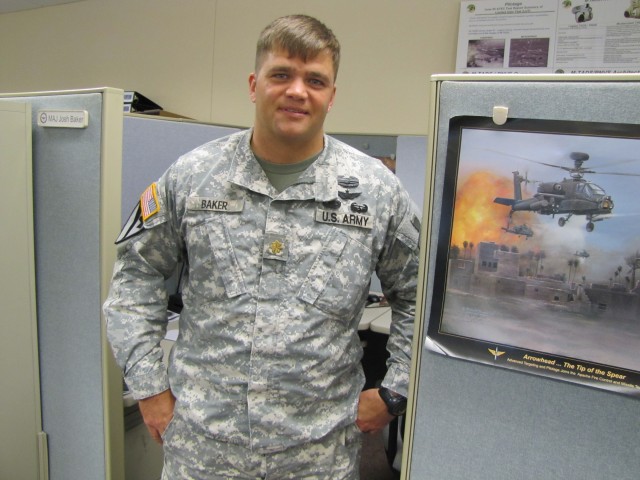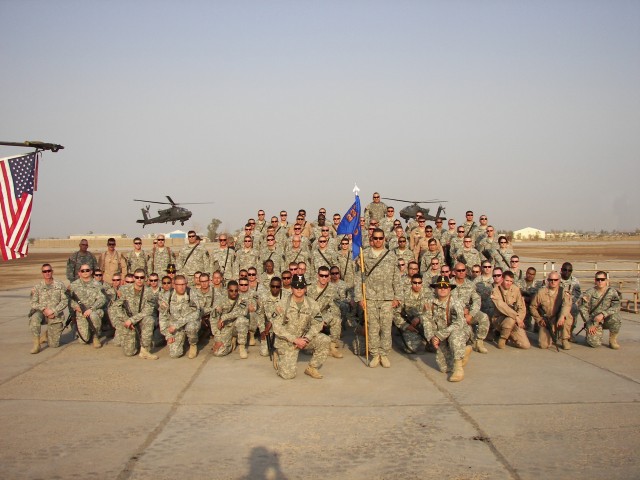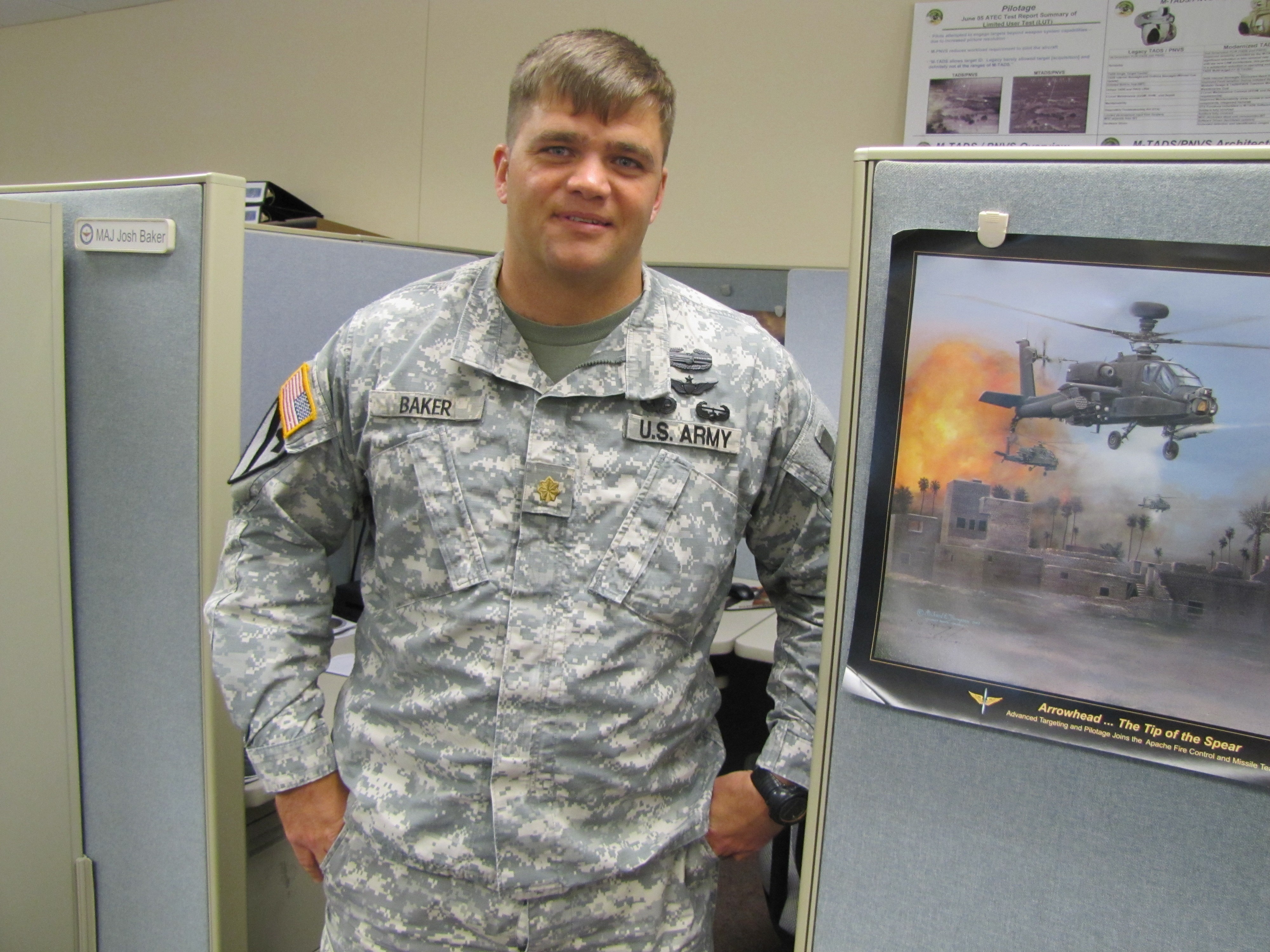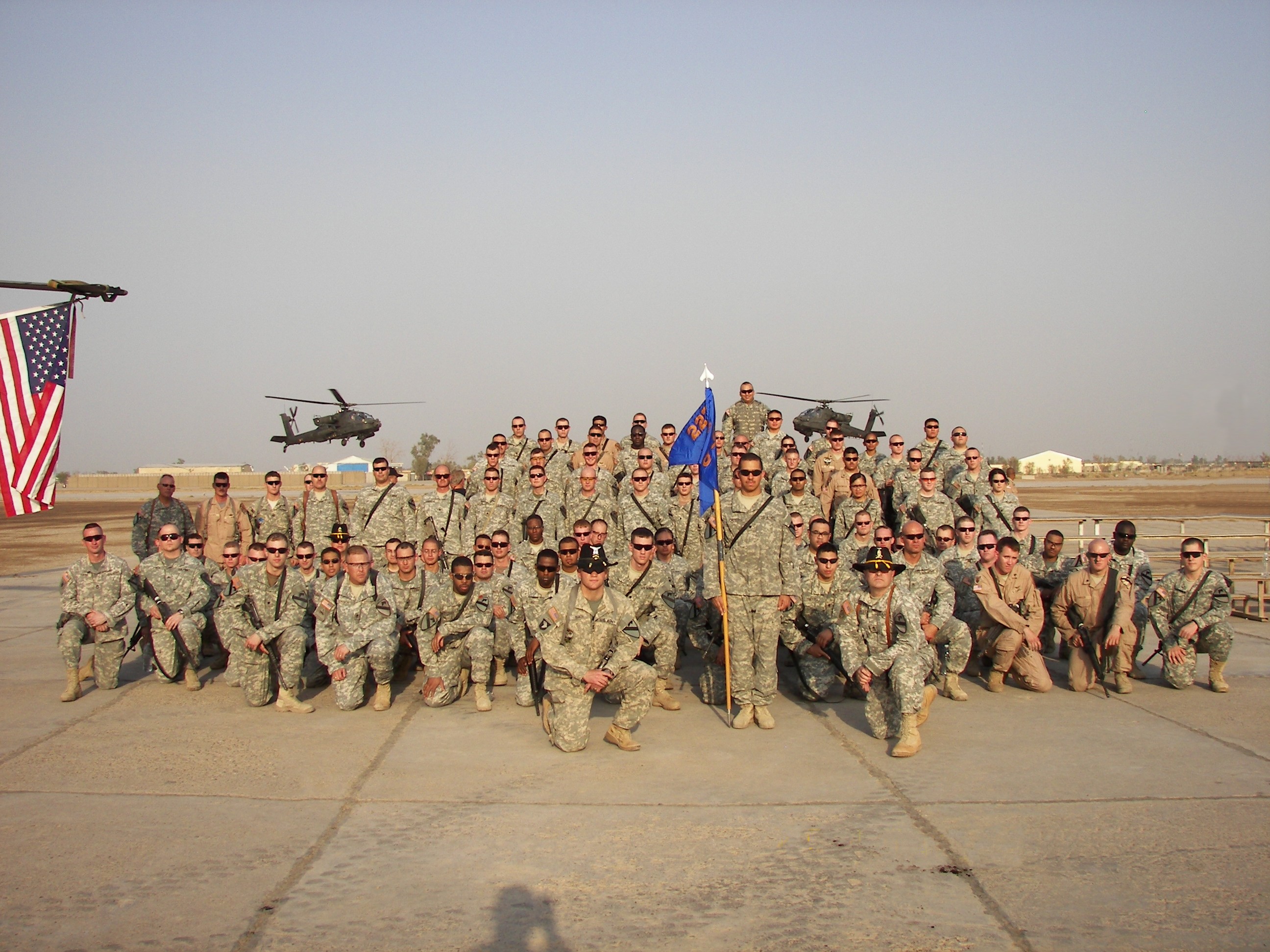REDSTONE ARSENAL, Ala. -- The business of the Army will take the stage later this month at the Von Braun Center when one of Redstone Arsenal's aviation Soldiers is featured as a nominee for the 2010 Young Professional of the Year.
Maj. Patrick "Josh" Baker is an Acquisition Corps officer and the assistant product manager for Apache Sensors, Apache Project Office, Program Executive Office for Aviation. He is a two-time Operation Iraqi Freedom veteran from a family of war fighters that includes an older brother who is an aviator and a younger brother in the infantry. He is an Apache helicopter pilot with more than 800 combat flight hours and two Bronze Star medals in his arsenal of honors.
And now he is among 25 local nominees for Young Professional of the Year, a program sponsored by the Chamber of Commerce of Huntsville/Madison County. The nominees and the winner will be presented during a dinner in their honor at the Von Braun Center on Aug. 31.
"I was really honestly humbled. I don't know who nominated me," said Baker, 33. "When I was filling out the application, I saw that it was completely geared toward civilian nominees. I don't know if I deserve this recognition because I'm a Soldier and I'm a little rough around the edges. Most people in the civilian world don't know that it is a job to equip Soldiers in national defense or they haven't had the exposure to the face of the Soldier who has been in the threat.
"Maybe my nomination will give them a new appreciation and assessment of what we are doing to equip and train today's Soldiers. Maybe my nomination will give them a more realistic perception of Soldiers and the profession of being a Soldier."
Both as war fighters and career employees, Baker said Soldiers "display the ultimate level of professionalism and valor." And, when it comes to equipping Soldiers, acquisition officers - both Soldier and civilian - are the best at negotiating, acquiring, fielding and providing the most effective and efficient tools and equipment.
"The Army's business and the business of running a company are similar and worlds apart," he said. "They require good leadership that is focused on the mission and headed in the right direction.
"My job is about the business side of equipping the Soldier. We are taking care of the Soldier by providing what they need to do their job."
As an acquisition officer, Baker brings his 27 months of combat war fighter experience to work in the Army's business arena.
"I am an example of the type of young professional warrior in the ranks during this time of war. More specifically, I believe that my experiences in combat bring a renewed sense of purpose to the civilian acquisition professionals I work with on Redstone Arsenal," he said.
Baker's venture into the business side of the Army began at Redstone, when, in 2008, he assumed the position of assistant product manager for Aviation Tactical Communications Systems for the PEO for Aviation. During that first year working in the acquisition field, Baker was responsible for the cost, schedule and performance of five fielded aviation radio systems, the procurement of one future development radio system and the management of more than 52 contracts valued in excess of $1 billion.
In 2009, he became the assistant product manager for Apache Sensors, where he is responsible for the procurement and fielding of the Modernized Target Acquisition Designation System, and negotiating and managing contracts valued in excess of $20 million for the production and sustainment of Apache sensors. He leads a team of logistics and technical specialists in execution of fieldings, logistics support and new equipment training; and he plans and executes a $6.6 million contract to reset sensors following deployments to Iraq and Afghanistan.
"Apache Sensors are the best infrared technology we have in today's conventional Army," Baker said. "They are making a difference in the current fight. Having personally flown in excess of 800 combat flight hours utilizing the FLIR (forward looking infrared) sensor system on the Apache, I understand the lethality of the product I now help field. I go to work every day knowing that the efforts of my team help save the lives of countless patriots."
Baker said the effectiveness of the aviation acquisition team is directly correlated to the commitment of management and employees at PEO for Aviation.
"This is by far the best leadership I've had in the Army," Baker said. "Everyone around here is highly trained, very knowledgeable and an asset to the Army mission. Every day of the week I learn something and I'm challenged by the environment. I see how real world business decisions affect Soldiers every day."
As a pilot, Baker knows what is needed to be successful in the Apache cockpit. He is eager to share his experiences with co-workers and anyone who is interested in the unique mission of the Apache. Baker was in one of the first classes of the Longbow version of Apache.
"The Apache's main mission is to support the guy on the ground. It's more dynamic than flying from point A to point B. Apache pilots are like flying infantrymen. We use very similar tactics. We take protecting the guy on the ground to a whole different level," he said.
"The hard part isn't flying the aircraft because it becomes like an extension of your body. The difficulty is running the mission."
Two deployments to Iraq - one during the invasion and the other during the surge -- taught Baker a lot about "running the mission."
"During the first deployment, there was a lot about the unknown. Most of us had never been in combat," Baker said. "The living conditions were deplorable, but the missions were predictable and more planned.
"During the second tour, we never knew what was going to happen. There was a lot more fighting and a lot more threat. It was important to know what tactics we needed to focus on and how to deploy our assets, especially our Soldiers."
Baker was involved in high intensity conflict operations during the invasion of Iraq in March 2003. During that deployment he oversaw the actions of 20 Soldiers and four Apache helicopters, and executed duties as a front seat co-pilot Apache gunner during combat operations.
Also, during the final months of the first phase of Operation Iraqi Freedom in 2003, Baker was the battalion liaison officer for the 3rd Brigade, 101st Airborne Division, Rakkassans. He was responsible for the coordination of 24 Apache helicopters in their supporting role to an infantry unit working in an area of operations about the same geographical size as the state of Alabama.
Baker returned to Iraq in 2007 during the surge in Baghdad as the Longbow Apache Attack company commander for the C/1-227th Attack Recon Battalion, 1st Cavalry Division. The command involved overseeing the actions of 46 Soldiers and eight Apache helicopters, and executing duties as a dual seat pilot in command of an Apache during combat operations.
During that same deployment, he also served as the Longbow Apache Attack Maintenance Company commander for D/1-227th Attack Recon Battalion, 1st Cavalry Division, during which he was responsible for the actions of 141 Soldiers, and the maintenance and redeployment of 24 Apache helicopters. The unit was charged with repairing the most significant battle damage on Apache helicopters. Baker also continued to serve in his role as an Apache dual seat pilot in command.
"I've seen what valor and professionalism is to the Soldier," Baker said. "During the surge in Baghdad we were often called to assist infantry units. One particular time, a front seater in an Apache took shrapnel in the face. The front window was shot out. My Apache took fire. We all were forced to land. But all we wanted to do was get back out there and help the infantry units. That's valor and professionalism."
In another situation, mortar fire hit the rocket pod of a parked Apache. Smoke indicated that the 19 rockets in the rocket pod could explode, destroying the Apache and possibly sending rockets in flight at random. To prevent either catastrophe, Soldiers rushed in to remove the rockets from the smoking rocket pod.
"They were young Soldiers doing their job. They pulled the rockets out while the pod was on fire," Baker said. "You see kids like that step up in some very trying circumstances. They step up as professionals and they perform."
In another situation, one of Baker's sergeants was walking out to the flight line when a mortar round came in about 20 feet away, killing a medic.
"It happened the same day my sergeant was scheduled to return home for a mid-tour leave," Baker said. "The sergeant administered first aid even though mortars were still coming in. The medic died from shrapnel that punctured his lungs.
"The hardest thing I've ever had to do as a leader was to tell my sergeant to not take that situation home to his family. I had to look in his eyes and remind him that he was going home to his family, and that they needed him to come home. I've lost friends down range and have been in situations where I didn't think things were going to work out while flying. But nothing can compare to what it took to muster the moral courage and fortitude to look my Soldier in the eyes and tell him to cope."
On the battlefield in Iraq or Afghanistan, there are constant reminders that war is not a game, and that Soldiers have the moral convictions and integrity to serve their country.
"If you kind of step back and see the fiber of the kind of people in this U.S. Army, you see they come from all different places, they are different races and religions, they come from different families. But, in the end, they take care of each other," he said.
Baker knew at a young age that he wanted to be an Army helicopter pilot. He grew up with a father who was an Army infantry officer and attended Auburn University, where he was active in ROTC and received a bachelor's degree in aviation management. When it came to choosing his helicopter, the Apache was an easy choice.
"I definitely wanted to be in something I can shoot back in," Baker said. "And the Apache is the most sophisticated attack helicopter in the fleet. All helicopters are complex systematically. But when you add the weapons and systems of the Apache, it's a whole different game."
Baker's older brother led the way in aviation. All three brothers have made their own significant contributions to the nation's defense.
"My dad is naturally very proud of us. But my mom has been worried at times," Baker said. "My brother, Cain, (a major) and I have served in the same battalion together at one point. We've worked around and flown around the same people in different situations and different tours. We've been in some very tough situations.
"My little brother, Zach, (a captain) was in Baghdad finishing up the surge. He can't count how many times the Apache saved his Soldiers on the ground. We're (aviators) thankful for what they (infantry) do and they're thankful for what we do."
The family is now growing as Baker and his wife, Hayley, a reporter with WAAY-TV, Channel 31, welcomed their new baby daughter earlier this month. Their journey into parenthood was featured in a special WAAY-31 series called Operation Baby Baker.
Baker's career plans include continuing in the Acquisition Corps and with positions in PEO for Aviation. He is a graduate of the Army's acquisition and contracting basic courses and has been accepted into the master's degree program at the University of Alabama-Huntsville. He is considered a mid-level officer in the Acquisition Corps and has aspirations to upper management.
"My life is full of incredible blessings," said Baker, who enjoys spending time with his young family, helping his wife with various charity projects and playing the five-string banjo. "We love living here. My wife and I are excited about starting our own family, and I have a great job with professionals who are dedicated to Soldiers."




Social Sharing